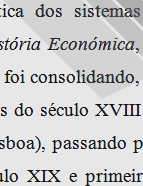

................................
His notable contribution to economic history stemmed from his perspective on it: "technical equipment and the relations of production and distribution condition all social organisation and the latter two, in general, condition culture and politics) In short: the economy influences all aspects of human life (partly because of its universality)" (apud J. Romero Magalhães, Idem., p. 5). Additionally, Vitorino Magalhães Godinho was one of the leading representatives of the Annales historical school, and his extensive work embodies some of its most relevant innovations, as has been duly emphasised, namely: a) interdisciplinarity and unified total history; b) history as an intellectual elaboration; c) other constructions of history; d) and history as a reading of the present and the future in the light of the past (José Luís Cardoso, "Vitorino Magalhães Godinho...", 2014, pp. 108-113; see also Luís Adão da Fonseca, "Vitorino Magalhães Godinho", 2014, pp. 69-70). Another significant contribution to economic history was made by Armando Castro (1918-1999). He completed his primary and secondary studies in this city, after which he attended the Law School of the University of Coimbra (1936-1941), where he graduated in Legal Sciences (1941) and specialised in Legal-Economic Sciences (1942). His extensive work in the field of economic and social history was largely conducted outside the university environment, as he was prevented from pursuing an academic career until the revolution of 1974, when he was finally hired as a full professor at the Faculty of Economics of the University of Porto (Bastien, 1996; 2001). Concurrently practicing law and a publicist, he devoted himself to research in economic and social history, as well as to the theory and epistemology of sciences and history, publishing several works in these areas (José Amado Mendes, Op. Cit., 1996, pp. 315-318). In his research, he remained faithful to his Marxist worldview, applying to historical research the methodology and analytical perspective grounded in historical materialism. As previously underlined, the publication of Armando Castro's study, Alguns aspectos da agricultura nacional [Some aspects of national agriculture] (1945), was "perhaps the first significant event" of the Marxist current that emerged in the post-war period, alongside the neoclassical-Keynesian synthesis (Carlos Bastien, A divisão..., 2000, pp. 21-22).
